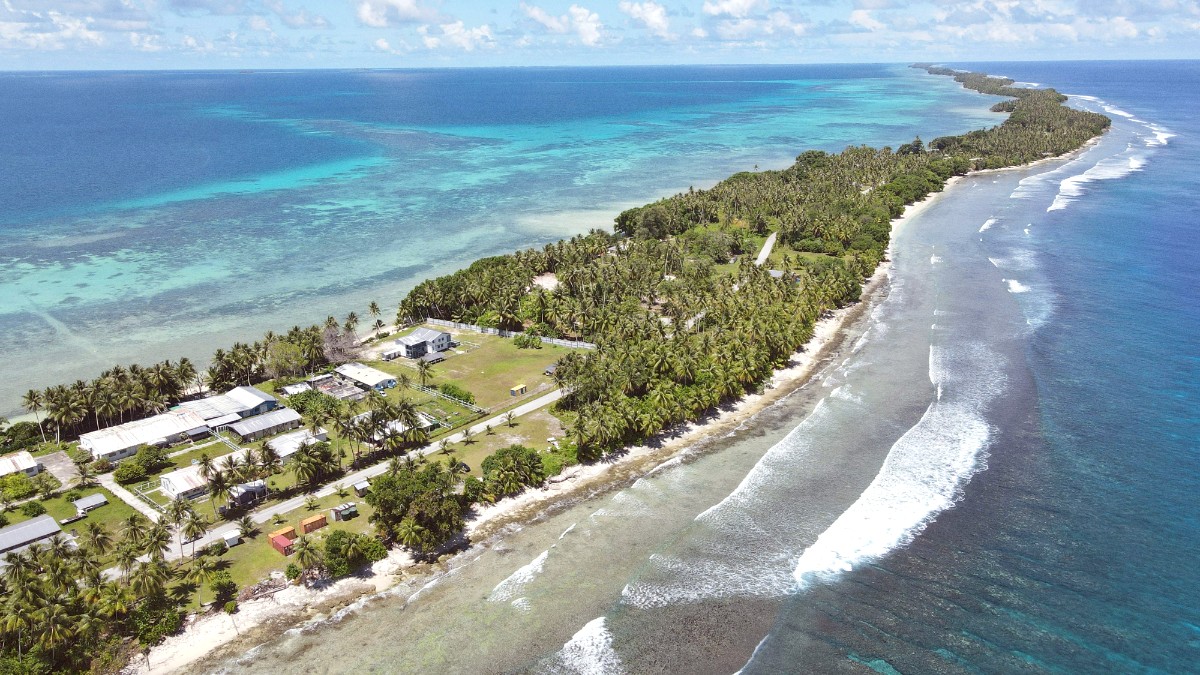
Tuvalu’s tropical maritime climate shapes the best times for your trip. Expect consistently warm temperatures and high humidity year-round, typically ranging from 27-30°C (81-86°F), with humidity around 80%.
Tuvalu features two main seasons. The Wet Season (Laulau) runs from November to April, with heavier rainfall and a greater risk of tropical cyclones. Rain showers can be intense but often pass quickly. The Dry Season (Kautonga) from May to October, presents generally drier conditions with slightly lower humidity. Southeasterly trade winds offer a refreshing breeze.
For water activities like snorkeling, swimming, fishing, and lagoon exploration, May to October (Dry Season) offers the best visibility and generally calmer seas.
Cultural experiences are available year-round, but outdoor community events are more pleasant during the drier months. General island exploration, including walking and cycling, is more comfortable during the dry season due to less humid conditions.
Risk in wet season (Nov-Apr)
Bring strong winds, heavy rainfall, and dangerous storm surges.
Travel disruption, communication loss, and local service interruptions.
Ongoing challenge for the nation
King tides cause temporary inundation of low-lying areas.
Roads and accessibility may face temporary challenges.
Consistent tropical warmth
Temperatures stay stable; humidity defines the feel.
No extreme heat waves, but high humidity is constant.
Tuvalu lies within a cyclone belt, especially vulnerable during the wet season (November to April). Cyclones bring strong winds, heavy rainfall, and dangerous storm surges. Such events disrupt travel, communications, and local services. Monitor local weather forecasts and advisories closely during this period.
While not a "weather consideration," Tuvalu's low elevation renders it acutely sensitive to sea-level rise. "King tides" occasionally cause temporary inundation of low-lying areas, impacting roads and accessibility. This ongoing challenge shapes daily life for residents.
27-30°C (81-86°F) year-round
Around 80%
November to April (Laulau)
May to October (Kautonga)
Approximately 3,000 mm (120 inches)
Tuvalu maintains a straightforward visa policy for visitors, reflecting a welcoming approach to tourism.
Most nationalities, including citizens of the United States, United Kingdom, Canada, Australia, New Zealand, European Union countries, and many Pacific Island nations, receive a visa on arrival.
Prepare several documents for smooth entry into Tuvalu.
These services may assist with visa applications or travel insurance coverage for your trip.
Tuvalu's lack of extensive tourism infrastructure and reliance on imported goods impacts prices. Cash is the preferred method of payment.
The official currency of Tuvalu is the Australian Dollar (AUD). Tuvalu lacks commercial banks, and currency exchange facilities are extremely limited, mainly at the National Bank of Tuvalu in Funafuti during weekday business hours. Relying on these facilities for large exchanges is not advisable.
There is at least one ATM at the National Bank of Tuvalu, but its operational status is unreliable. Credit card acceptance is limited; only a few larger accommodations and some government offices accept them. Small shops, local eateries, and most services operate strictly on a cash-only basis. Travelers' cheques are not accepted anywhere.
Daily Costs: AUD 100-150 (approx. USD 65-100)
Accommodation: AUD 50-80 (basic guesthouse)
Meals: AUD 30-50 (local eateries, self-catering)
Daily Costs: AUD 150-250 (approx. USD 100-165)
Accommodation: AUD 100-180 (guesthouse with private bath or standard hotel room)
Activities: AUD 30-50 (organized boat trips, snorkeling)
Daily Costs: AUD 250+ (approx. USD 165+)
Accommodation: AUD 180+ (best available hotel room)
Activities: AUD 50+ (personalized boat tours, fishing charters)
| Category | Low End | High End |
|---|---|---|
| Guesthouses | AUD 50 | AUD 100 per night |
| Vaiaku Lagi Hotel | AUD 100 | AUD 250+ per night |
| Local Meals | AUD 5 | AUD 15 per meal |
Tuvalu is known for its safety, but its remote location with limited medical facilities calls for good preparedness.
Measles, Mumps, Rubella (MMR), Diphtheria, Tetanus, Pertussis (DTP), Polio.
Recommended for most travelers, especially those consuming varied food/water.
Consider if dining outside major hotels or in rural areas.
Princess Margaret Hospital in Funafuti is Tuvalu's only hospital.
It offers basic medical care. For serious conditions, medical evacuation to Fiji or Australia is typical. Such evacuations are costly and time-consuming.
Emergency Numbers (Funafuti): Police, Fire, Ambulance are all 911.
Affiliate Resource: Adventure Medical Kits - First aid supplies.
Use Insect repellent containing DEET (25-50%) or picaridin. Wear long sleeves/pants, use mosquito nets.
Drink bottled/boiled water. Use a Portable water filter if needed. Avoid ice, unpeeled fruits, and raw vegetables from uncertain sources.
High-SPF (Broad-spectrum sunscreen 30-50+), Wide-brimmed hats, sunglasses. Seek shade, stay hydrated.
Tuvalu maintains an extremely low crime rate, ranking among the safest destinations. Violent crime against tourists is exceptionally rare. Petty crime is uncommon but can occur if valuables are unsecured. No specific high-crime areas exist.
Comprehensive travel insurance is a must for any trip to Tuvalu due to limited local medical facilities. Ensure coverage for emergency medical treatment, medical evacuation to Fiji/Australia, repatriation, trip cancellation/interruption, and lost luggage.
Review policy details for exclusions, especially for adventure activities. An affiliate: World Nomads.
Local Emergency: Police/Fire/Ambulance: 911. Save your travel insurance emergency hotline.
Most countries lack an embassy in Tuvalu. Contact your embassy/high commission in Fiji (Suva) or Australia (Canberra).